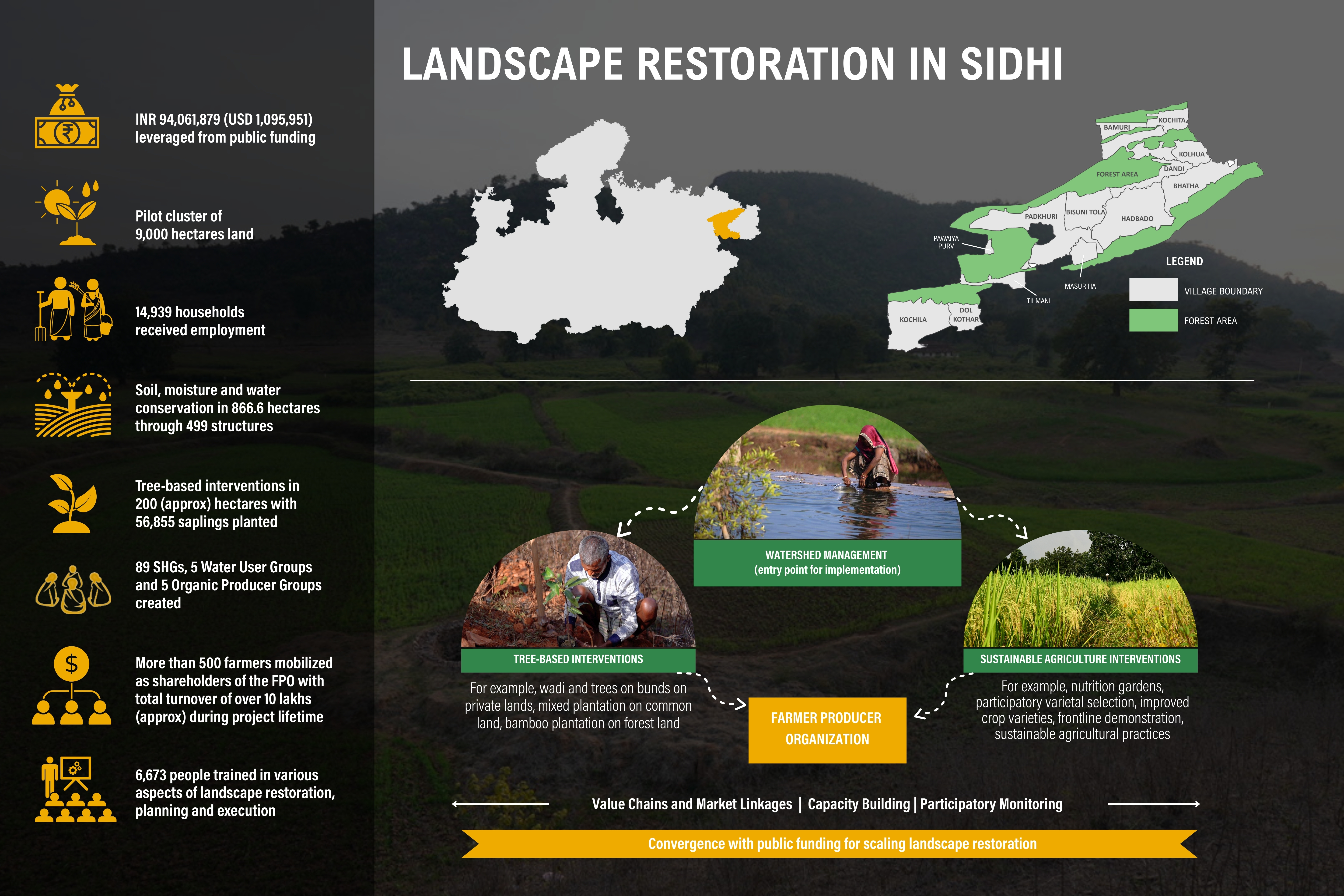Landscape Restoration in Sidhi, Madhya Pradesh
Landscape restoration can offer tangible benefits for people, nature, and climate – creating livelihoods, providing food and nutritional security, enhancing the flow of ecosystem services, and contributing to climate mitigation, adaptation, and resilience. Over 100 million hectares of land in India offers the potential for forest protection and landscape restoration, as identified in WRI India’s Restoration Opportunities Atlas. Out of this, the state of Madhya Pradesh (MP) has a potential for forest protection and landscape restoration in over 20 million hectares while the Sidhi district in MP alone has the potential to restore 300,000 hectares (more than 70%) of its total land through nature-based solutions such as landscape restoration.
Despite the proven potential of restoration, government commitments, and enabling policies, the implementation of restoration interventions has been sub-optimal. It continues to face several challenges, including a lack of business models, value chains and access to good quality planting material; policy and regulatory gaps; and poor technical capacity and knowledge of restoration implementers. The lack of coordination between government departments also makes it difficult for local restoration champions (non-governmental organizations and small- and medium-sized enterprises) to access opportunities for support, leaving them eager to act but lacking the capacity to scale up their work. At the policy level, the fragmented approach to policy implementation has resulted in the creation of implementation silos run separately by departments or by program implementation units within the same department impeding the uptake of landscape restoration interventions in an integrated manner.
To address these barriers and demonstrate landscape restoration as a potential nature-based solution for climate risk mitigation and adaptation, a landscape restoration pilot project in Sidhi district was launched in 2021, prioritizing a cluster of 13 villages (~9,000 ha) with support from HSBC under the Climate Solutions Partnership. WRI India collaborated with Panchayat and Rural Development Department, Government of Madhya Pradesh and implementation partner, Action for Social Advancement to implement landscape restoration interventions in an integrated landscape approach. Given that Sidhi is representative of land use challenges prevalent in the region, this project is implementing various restoration interventions such as water resource management, tree-based interventions, formation of a farmer producer company to generate livelihoods through establishing value chain for bamboo and other agriculture products, additionally, to improve nutritional security amongst locals, sustainable agriculture and nutrition gardens have been promoted. This has resulted in equitable access to flow of ecosystem services such as sustained availability of water in post-monsoon months, irrigation, food and nutritional security, improved soil health and enhanced livelihoods resulting in biodiversity conservation and human development.
The key levers of this project that have aided the implementation process include a citizen science monitoring application comprising of biophysical and socio-economic indicators. This app has been tested in the pilot area and data has been collected for different interventions which is essential for measuring the impact of ecosystem services generated through restoration. Additionally, building capacities of community-based organizations such as the Self-Help Groups, water user groups, and Panchayati Raj Institutions has been instrumental for post project sustenance and ownership of the project. Establishing a streamlined governance modality has been central to resolving policy barriers and leveraging public funds through convergence of government schemes for overall streamlined implementation of restoration interventions.
The pilot project in Sidhi district demonstrates the integrated landscape approach, highlighting the role played by different government departments and civil society organizations in its implementation. The Sidhi pilot project enabled systematic streamlining of restoration efforts previously implemented in silos through existing government schemes. By gaining the support of the state government and demonstrating stakeholders’ willingness to explore wider applicability, the Sidhi project established the proof of concept for replicating similar models in other geographies in a contextualized manner.


Featured Videos
- Unfolding Sidhi’s Restoration Story
- Restoring Land, Restoring Lives: Learning from Sidhi, Madhya Pradesh
Featured Podcast
Nature-Based Solutions for Enhancing Climate Resilience: Restoring India's Landscapes

